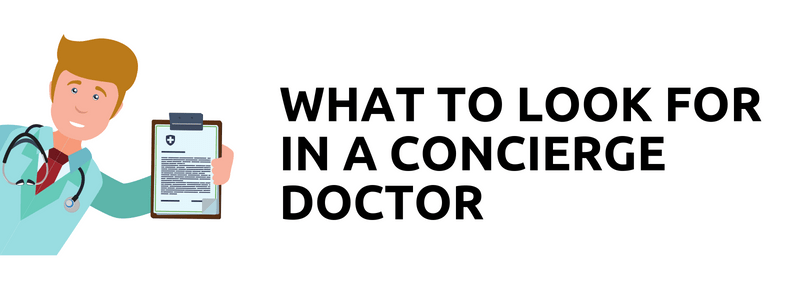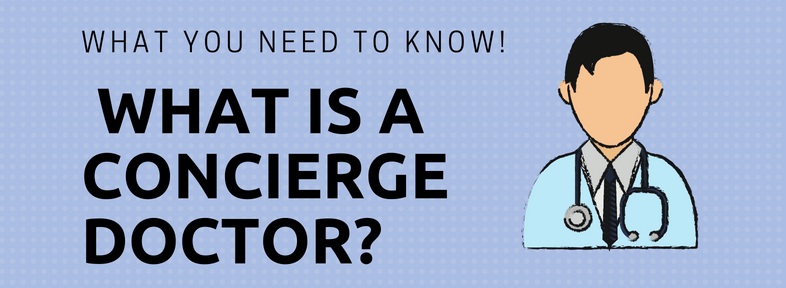Crowded waiting rooms, long wait times, and then there’s that one person sitting across from you who just won’t stop coughing and blowing their nose. Sounds like a fun way to spend a couple of hours – right?
No, of course not.
Unfortunately, that is what seems to happen a lot of the time when you have to go to the doctor. You’re stuck in a room full of sick people and if you didn’t have something germy going on before you came in, you most likely will catch it after sitting there all that time.
But…stop for a moment and let’s think.
What if it didn’t have to be like that. What if I told you there is a better way?
That’s where concierge medicine comes in. You may also see it advertised or hear it referred to as boutique medicine, direct care, or retainer-based medicine. The concept of concierge medicine isn’t really new, but it is one that is gaining in popularity.
What You Should Know About Concierge Medicine
It may seem like the latest buzzword in modern medicine, but concierge medicine really isn’t new. It’s been around a long time, all the way back to when doctors use to make house calls as part of their daily practice.
In 1996, however, the latest model of concierge medicine began to take shape when a Seattle doctor decided that rather than have a lot of patients, he would ask his patients to pay a retainer for what he referred to as “highly attentive medicine.” By doing so, he did not have to rely on the fees-for-service that are regulated by insurance companies.
At its core, this new definition of concierge medicine is that it is a contractual relationship between a primary care physician and a patient, in which the patient pays the doctor an annual fee or retainer.
What the patient receives for this fee does and can vary, but the agreement typically is that the doctor will limit the number of patients he or she sees to ensure that they can provide exceptional care for each patient, and perhaps more importantly, that they are available for all their patients by being able to take as much time with them as is needed.
You see, in a traditional medical practice, a doctor may have around 2,000 patients that they see each year, so a typical day will involve them seeing one patient about every 10 to 15 minutes. That’s why some doctors are in such a rush when they come into the exam room, they are going up against the clock each and every day.
Part of the reason for having to see such a high number of patients is because of the way that insurance companies reimburse a medical practice. The doctor literally has to stay that busy just to be able to make ends meet. In turn, the personalized attention given to each patient can sometimes suffer because the doctor feels so rushed to get on to the next patient and then the next patient and so on.
In comparison, a concierge doctor generally has 500 or less patients. This allows them to spend more time with each patient and lets them also focus more on preventive health care. Some concierge doctor may also offer specialized services, such as 24-hour access to the doctor, low waiting room times, and guaranteed same-day visits. In some practices, the doctor may even make house calls.
You should realize that most concierge doctors do not take traditional health insurance though. When they don’t take insurance, the doctor saves money since they don’t need as big of a staff to file insurance claims. When this is the case the doctor may pass on those savings to you in the form of cheaper fees or rates.

Is a Concierge Doctor Worth the Cost?
Although you may think that having a concierge doctor at your beck and call only makes sense if you’re one of the uber wealthy, this is actually not the case. Many people have discovered that a concierge doctor is worth it because they can actually lower the cost of their overall medical care by combining a Catastrophic PPO health insurance plan with concierge care. Put the two together and they are often not only the equivalent of having traditional health insurance, it’s sometimes even cheaper.
Here’s why:
Many Catastrophic PPO plans have a zero deductible and a low monthly premium, which actually makes them more affordable than a group plan, COBRA, or even insurance through the ACA (Affordable Care Act) aka Obamacare. Catastrophic PPO plans are designed for when you are admitted to the hospital because of an unplanned medical event or accidents, such as if you break your leg or get stung by a bee and go into anaphylactic shock. They do not cover routine doctor visits or preventive care.
On the other side of the coin, concierge doctors often offer preventive care as part of their fee and you get the convenience of having quick access to their service for when you need a routine physical, bloodwork, or even if you just have think that you’re coming down with a cold.
Even though you do not have traditional health insurance through the ACA, by having both a Catastrophic PPO plan and concierge care, you’re still covered for emergencies, as well preventive care and routine visits, but often at a cheaper cost. In some cases, it could even be half the cost of Obamacare.

What to Look for in a Concierge Doctor
It is important to realize, however, that concierge care can mean different things to different people. Everything from the level of care a doctor will provide to the customer service standards of the practice itself can vary.
Annual fees can also vary wildly from one concierge practice to another. It can go from around a few hundred dollars all the way to $15,000. A quick look at some of the local Cobb County doctors that offer concierge service in our area shows that you can expect to pay somewhere around $137.50 a month.
Before you begin your search for a concierge doctor you should decide which amenities are important to you since it’s not a “one-size-fits-all.”
If you’re not sure what you may or may not need, here’s some things you should consider:
- Do you want to be able to talk to someone if you have a medical emergency at night or on the weekends or holidays? If so, you may want a doctor with 24/7 access. This benefit is similar to one of the benefits that you can also receive through a Catastrophic PPO plan.
- Do you want your doctor to focus on preventing illness and helping you live a healthier lifestyle? If so, you should ask if your potential doctor about wellness offerings and whether he/she does preventative testing.
- Do you vacation out of state or travel a lot? If so, you may wish to find a doctor that offers phone consultations as part of their practice.
Finally, make sure to interview your potential concierge doctor at length before you sign on the dotted line to ensure that they are someone you will feel comfortable seeing on a regular basis. They can’t provide that extra level of care and service if you are constantly trying to avoid going to see them.
If You Have Questions About Your Health Insurance Coverage – I’m Here to Help
Having good health insurance coverage is important. If you have a medical emergency or illness strikes, you should never have to worry about whether you can pay your medical bills while you’re in the hospital.
Whether you’re interested in learning more about Catastrophic PPO plans or simply have questions about the coverage you already have now, I’m here and ready to answer all of your questions. Contact me today and let’s talk.


